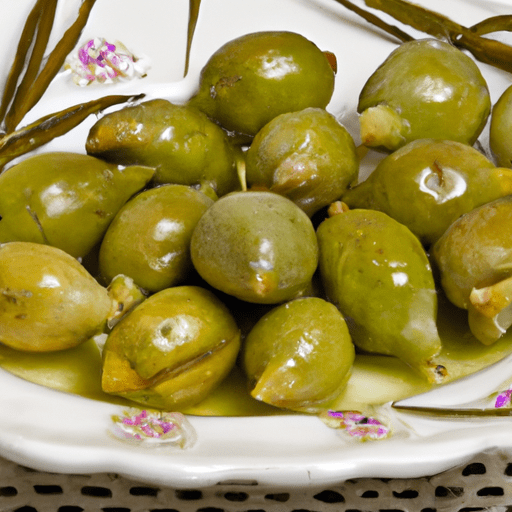The Versatile Delight: Capers
If you’re a culinary adventurer, then you’ve probably come across capers at one point or another. These little green wonders may be small in size, but they pack a punch when it comes to flavor. Widely used in Mediterranean cuisine, capers bring a unique tangy and briny taste to a variety of dishes, making them a must-have for any aspiring chef’s pantry.
The Taste of Capers
Capers have a distinctive flavor that is hard to miss. They offer a sharp and piquant taste, which is often described as tangy, salty, and slightly acidic. The intensity of their flavor can vary depending on the size of the capers, with smaller capers tending to be more potent in taste. The brininess of capers is what makes them an ideal ingredient to enhance the flavor profile of many dishes.
Culinary Uses
Capers have been extensively used in Mediterranean cooking for centuries. Their unique flavor profile adds a refreshing and zesty touch to numerous recipes. Here are some common ways to incorporate capers into your culinary creations:
Sauces and dressings: Capers are often incorporated into sauces and dressings to elevate their taste. From classic tartar sauce to robust puttanesca sauce, capers bring a delightful burst of flavor to any dish.
Fish and seafood: Capers and fish are a match made in culinary heaven. The vibrant and tangy notes of capers complement the delicate flavors of seafood beautifully. Sprinkle some capers over grilled fish or add them to a seafood pasta for an extra kick.
Salads: Introduce a burst of flavor to your salads by tossing in some capers. They pair well with greens, vegetables, and even chicken or tuna salad, providing a lively and zingy sensation.
Pizza and pasta: Capers can be a unique addition to your pizzas and pasta dishes. Whether you prefer a traditional Margherita pizza or a spaghetti with fresh cherry tomatoes, capers can add a delightful twist, brightening up the overall taste.
Nutritional Value
Beyond their culinary appeal, capers also offer some nutritional benefits. Although they are typically used in small quantities, they can still contribute to your overall well-being. Here’s a brief overview of the nutritional value of capers:
Low in calories: A tablespoon of capers contains approximately 2-3 calories, making them an ideal choice for those watching their calorie intake.
Rich in antioxidants: Capers are packed with beneficial antioxidants that help protect your body against free radicals and oxidative stress.
Good source of vitamins and minerals: Capers provide a decent amount of vitamin K, vitamin A, and iron, which are essential for overall health and wellbeing.
The Captivating History of Capers
Capers have a long and fascinating history, dating back thousands of years. They were widely used among ancient civilizations, including the Greeks, Persians, and Romans. The caper bush, known as Capparis spinosa, is native to the Mediterranean region, where it thrives in rocky coastal areas.
Interestingly, capers are not the fruit of the caper bush but rather the unopened flower buds. These buds are carefully hand-picked, then dried and pickled in vinegar or salt to enhance their flavor and extend their shelf life.
Fun Facts about Capers
Capers are classified based on their size, with smaller varieties generally being more highly regarded due to their concentrated flavor.
In addition to their culinary uses, capers have also been used for medicinal purposes since ancient times. They were believed to have diuretic, anti-inflammatory, and digestive properties.
Capers are named after the Latin word “capparis” derived from the Greek word “kápparis”, which means “shrub.”
The island of Pantelleria in the Mediterranean Sea is renowned for its high-quality capers, and its caper plants have been recognized as a UNESCO World Heritage agricultural practice.
Conclusion
Capers may be small, but they make a big impact when it comes to flavor. With their tangy and briny taste, these Mediterranean gems have found a permanent place in the culinary world. Whether you’re adding depth to sauces, creating vibrant salads, or imparting a bit of zing to your pasta, capers can take your dishes to a whole new level. So, grab a jar of these delicious little buds and give your meals an exciting and tantalizing twist!
Facts About Capers:
Origin: Capers (Capparis spinosa) are perennial plants native to the Mediterranean region, particularly the shores of the Mediterranean Sea. They are widely cultivated in countries like Italy, Greece, Spain, and Morocco.
Common Uses: Capers are commonly used as a condiment in culinary dishes. Their briny, tangy, and slightly bitter flavor makes them a popular addition to sauces, dressings, salads, and various Mediterranean recipes. They are often paired with seafood, roasted meats, and vegetables.
Nutritional Benefits: Capers are low in calories and fat but pack a good amount of vitamins and minerals. They are a rich source of antioxidants, including quercetin and rutin, which have anti-inflammatory properties. Capers also provide some essential nutrients like vitamin K, iron, and calcium.
Unique Properties: One unique property of capers is their preservation method. Capers are actually unopened flower buds that are pickled in vinegar or salt. This preservation process gives them their distinct flavor and allows them to have a long shelf life.
Historical Significance: Capers have a long history of culinary use. They were mentioned in ancient Greek and Roman texts, where they were used both as a food and for their medicinal properties. In ancient times, capers were believed to have numerous health benefits and were included in remedies for ailments like rheumatism and digestive issues. Today, capers continue to be enjoyed as a flavorful ingredient in many Mediterranean dishes.
Note: It’s always important to consider personal dietary needs and allergies when incorporating new ingredients into your diet.




Use the share button below if you liked it.
It makes me smile, when I see it.